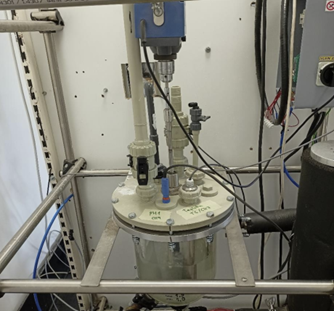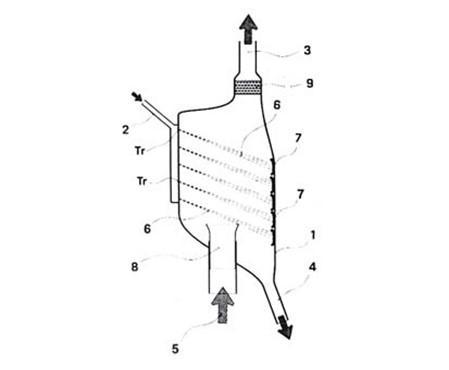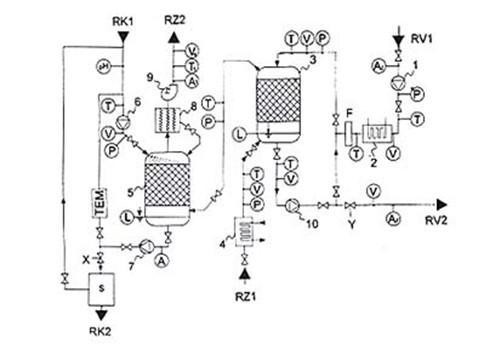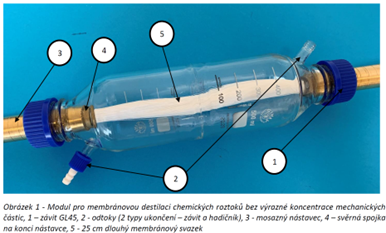

The research carried out at the Institute of Chemistry and Technology of Environmental Protection fully corresponds to the teaching content, and thus the Institute consists of two research groups. In particular, techniques for the collection and processing of environmental samples and advanced instrumental analytical methods, including ecotoxicological studies, are developed to elucidate the impact and fate of organic and inorganic pollutants in all environmental compartments.
Analytical and environmental chemistry are integral to the development of new and innovation of existing wastewater treatment or waste management technologies. Within analytical and environmental chemistry, the institute offers custom analysis and collaboration on research and development of new technologies to minimize environmental problems.
Within the framework of experimental research in organic chemistry and material sciences, we design, synthesize and optimize organic advanced molecules, oligomers and conjugated polymers using conventional as well as eco-friendly and sustainable methods and techniques reflecting the basic principles of the Green Deal. We are creating a platform for research in the areas of organic, hybrid and biohybrid materials for optoelectronics, photonics, biomedical and green and sustainable energy applications.
Since 2023, we have been working on the project Elimination of volatile substances from wastewater with simultaneous conversion into a secondary usable raw material using microporous hollow fibres from the TREND programme of the Technology Agency of the Czech Republic. The aim of the project is a complex technology capturing ammonia nitrogen from wastewater from industrial and agricultural activities, from wastewater treatment plants, biogas stations, leachate from municipal waste landfills and its transformation into a reusable form of ammonia fertilizer with gradual release of nutrients. It is an excellent research project with a reach not only in the Czech Republic, but especially within the EU. The project outputs meet the requirements of the EU "Green Deal", "Farm to Fork" and the ambitious EU "Fit for 55" package.

1st Autumn Workshop on Functional Organic Materials for Sustainable Future: On 15 and 16 November 2023, the 1st Autumn workshop on functional organic materials for a sustainable future took place at the Faculty of Chemistry, Brno University of Technology. A total 39 participants attended, and 28 lectures and presentations were on the programme. The event also included two public lectures by renowned personalities in the field of organic and physical chemistry, professors Serdar Sariciftci (JKU Linz) and Heinz Langhals (Ludwig-Maximilians-Universität München).

PhD student Dominik Veselý recently completed a practical internship in Oxford. Here he worked on research of semiconducting organic polymers for application in organic electrochemical transistors. These final functional devices are useful, for example, in sensory medicine, as they can play an important role in many biological processes of the human body.

In 2023, we obtained a patent for an air disinfection method, a disinfection washer and an air disinfection device. This is an excellent output with high social relevance addressing the issue of disinfection of virus-contaminated air in all enclosed facilities where a large number of people come into contact with airborne viral germs with impact not only within the Czech Republic.

For scientific work, it is essential to join a functioning network of international contacts: since his student days, Jozef Krajčovič from the Institute of Chemistry and Environmental Technology of the Faculty of Chemistry of the BUT has specialised in organic chemistry and organic synthesis. During his stay at the University of Bari last year, a broader basis of international cooperation was established, which today links the BUT with Italian and Austrian universities and has a promising future.

PhD student Lucia Ivanová is working on her dissertation on Synthesis and application of nature-inspired materials for photocatalytic processes under the supervision of Jozef Krajčovič. Her project "Nature-inspired photosensitizers for the development of solar fuels" was also awarded by the faculty in the framework of support for talented students of doctoral programmes.

In October 2022, a workshop entitled Bio and Sustainable Organic Electronics II was held at the Faculty of Chemistry BUT with the participation of world leading experts and their teams from Italy, Austria and Switzerland. The workshop included public lectures by prominent personalities in the field of bioorganic electronics.

PhD student Eliška Kameníková has dreamed of going to Australia since she was a little girl. She managed to do so thanks to an internship abroad, where she researched the impact of smart fertilizers and microplastics on the soil. As part of her PhD studies, she is investigating the fate of PET microplastics in soil. Specifically, she is interested in how microplastics can affect biotic and abiotic soil properties and how they are themselves affected in the environment. Collaborative research will lead to more sustainable agriculture.

In 2022, we were granted a patent for a method of separating ammonia from wastewater and equipment for carrying out this method. This is an excellent output with high social, economic and environmental relevance not only within the Czech Republic but also at the EU level.

Since 2021 we have been working on the project Membrane distillations based on ultra-thin polypropylene capillaries from the TREND programme of the Technology Agency of the Czech Republic. The aim of the project is to develop and put into production a module for membrane distillation using exclusively polypropylene capillaries, which are corrosion-resistant and chemically resistant in contrast to traditional metal parts, with a focus on the pharmaceutical and biochemical industries for handling thermally unstable substances when it is necessary to distil different substances at low temperatures.
